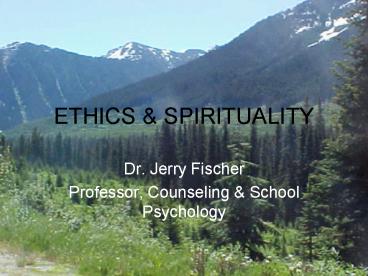ETHICS PowerPoint PPT Presentation
1 / 19
Title: ETHICS
1
ETHICS SPIRITUALITY
- Dr. Jerry Fischer
- Professor, Counseling School Psychology
2
Defining Spirituality
- What is the role of spirituality in mainstream US
culture today?
3
(No Transcript)
4
Religion Spirituality
- Spirituality ? Religion
- Religion ? Spirituality
- Spirituality ? Religion
5
(No Transcript)
6
Philosophy, Ethics, and SpiritualityA Short
Historical Overview
- Africa, the Americas, Australia, and other
places family, kinship, communal life, no
beginnings and ends, animism, nature is
spiritual. - Middle East
- Judaism-monotheism, law, blame and responsibility
- Zarathustra-monotheism, fire, evil, and Satan
7
History Continued
- India
- Hinduism-faces of one God, Brahma (creator),
Vishnu (sustainer), Shiva (destroyer), mysticism,
yoga (spiritual self-discipline), and liberation
from suffering. - Buddism, life is suffering, suffering comes from
selfish desire, desire can be eliminated,
enlightenment and Nirvana, reality is a series of
momentary existences, everything is linked
through a causal chain.
8
History Continued
- China
- Confucianism-harmonious community, jen (social
virtue) virtue vs. law, li (observing
ceremonial forms), disciplined exercise to
achieve spiritual mastery over oneself, chi
(energy). - Taoism, tuning the inner person to the rhythms of
nature, the Way of the universe, life and death
are a part of the yin and yang.
9
History Continued
- The Greeks
- What is reality? Thales-water, Anaximander-earth,
air, fire, and water, Pythagoras-mathematics,
Heraclitus-fire, Parmenides Zeno-reality and
appearance (no change), Democritus-atoms. - Socrates Plato-innate goodness, idealism (world
of forms ideas), material world is a shadow.
10
History Continued
- Aristotle-people have a purpose (and end)
Happiness (virtuous activity in accordance with
reason), virtue involves an optimum balance and
measure in ones behavior (the mean between
extremes), realism, substance and essence.
11
History Continued
- Christianity-mercy and forgiveness, love God with
ones whole heart and love ones neighbor as
oneself, sacrifice of Jesus, redemption for mans
sins, individual salvation.
12
History Continued
- Islam-monotheism, Allah, justice (reward good and
punish evil), jihad (war against evil), people
have an inner jihad, Allah distributes justice in
the afterlife. - The Middle Ages-proof of Gods existence, ethics
relies on Gods existence. - Plotinus, the Great Chain of Being, all of
reality is connected, from lower sense reality
to the higher spiritual reality. World of Sense
? Soul ? Divine Mind ?The Absolute Source.
13
That Man Kant
- Modern World-Galileo, Newton, Kepler, Bacon (our
experienced universe obeys laws), Kant, Critique
of Pure Reason, we experience (organize and
constitute) reality through our minds, but we can
sense objects in space and time and in causal
relationships, Critique of Practical Reason,
because we reason we can reach the same
conclusions regarding universally obligatory
laws. We are not controlled by the physical
world because our minds are constructed with free
will. Pure and Practical reason point to God but
our minds cannot prove God. We have faith
14
(No Transcript)
15
Reactions to Modernism
- Utilitarianism-(industrial revolution) greatest
good for the greatest number. - Romanticism-return to a more simple and
integrated world. - Existentialism-we create our own world-Nietzsche
(God is dead)-Kierkegaard-(leap of faith). - Marxism-dialectical materialism
16
More Reactions
- Unconscious-Freud, irrationality
- Pragmatism-learn by doing, what works, Dewey
- Logic-mathematics (Russell, Husserl and
Whitehead) - Mysticism-transforming our consciousness to
access higher orders of reality - Unified Field Theory-Cosmos, Newtonian, Quantum
- Post Modernism-feminism (Gilligan) and social
constructionism
17
What Can We Say?
- Looking back on the historical developments of
philosophy, spirituality, and ethics, what does
it mean? - Where have we come from? Where are we going?
- What does it mean for us as counselors? What
does it mean for our clients?
18
Principle Ethics Revisited
- Can we apply ethical principles without virtue or
spirituality? - What about cultural relativism?
- Is social constructionism the answer?
19
(No Transcript)

